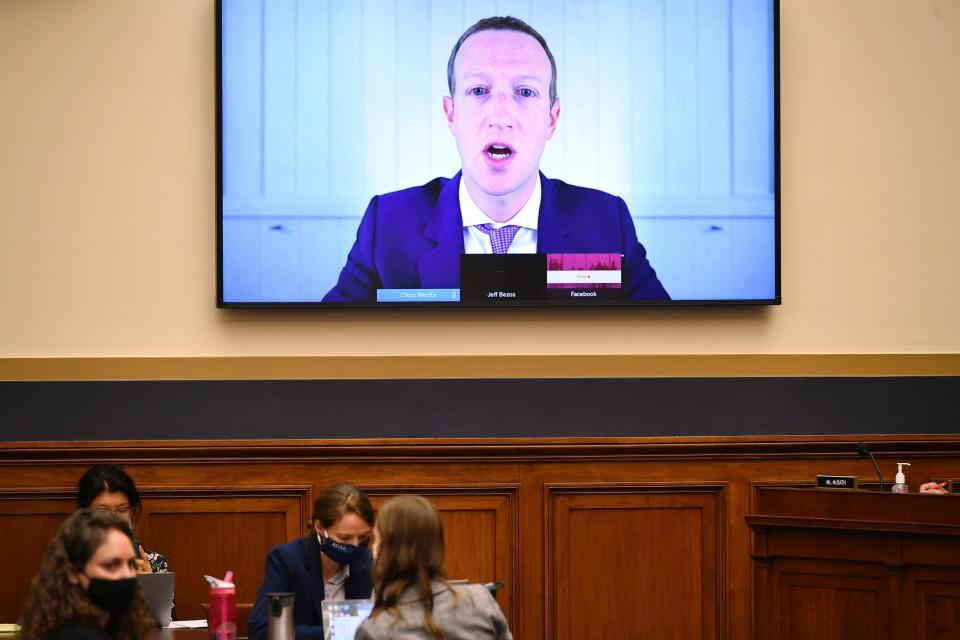Leaving big tech to govern themselves doesn’t work. They’re getting even worse

They were welcomed – only semi-jokingly – as “the emperors of the online economy.” The appearance at the US Congress last week of the CEOs of Amazon, Apple, Facebook and Google made one thing plain: these Silicon Valley giants represent a historic and alarming concentration of economic and political power. More troubling still for the UK is that the trade deal with the US could reinforce that dominance.
The heads of the world’s largest tech firms consistently demonstrate a troubling indifference to democratic scrutiny. One of the many conclusions from last week’s Intelligence and Security Committee’s report into Russian interference in UK politics was that social media platforms have entangled themselves in our daily lives but are failing to play their part in keeping us safe.
Meanwhile, misinformation and fake news have exacerbated and fuelled the deadly Covid-19 pandemic. Decisions by big tech companies like Facebook, Google and Twitter can drive the virality of anti-vaxx conspiracy videos as well as racist and anti-semitic abuse videos. How they design their algorithms determines what posts get removed and which ones get boosted.
Despite the companies’ bold claims about tackling misinformation about the virus, OfCom reported a consistent half of the population are seeing false or misleading information week after week. The Reuters Institute for the Study of Journalism examined 225 pieces of misinformation (claims fact-checked as false) around Covid-19; 88 per cent of these pieces were spread on social media, while only 9 per cent appeared on TV, and 7 per cent on other websites.
All of this demonstrates beyond doubt the need for tough regulation of big tech and social media companies: leaving them to govern themselves isn’t working. Democracy in the digital age should be able to hold these behemoths to account for how they affect the health of its citizens and of democracy itself.
It is alarming, therefore, that the government may tie its own hands through the US-UK trade talks. The US’s stated goals include specifically limiting the UK’s ability to scrutinise the tech companies. This must not be allowed to happen.
The government has promised to close the democratic deficit between tech companies and UK citizens. The stated ambition of four successive secretaries of state is to establish a statutory duty of care on the social media companies. This could mean empowering a regulator to enforce a kind of precautionary principle, asking the tech companies: have you first checked that your products will do no harm or that a change to your algorithm won’t fuel dangerous conspiracy theories or silence legitimate voices?
The US-UK trade talks could jeopardise the government’s ambition. The experience from Canada, where I now live and work, is cautionary. The trade deal between the United States, Canada, and Mexico, generally known as USMCA, introduced a digital trade chapter. But the deal also included what one Canadian professor, Michael Geist, has called a culture "poison pill". Now the US can theoretically retaliate with tariffs on other sectors if the Canadian government regulates online services or content in ways that the US government dislikes.
The digital elements of the deal flew under the radar during the trade talks. While the tech companies tripled their spend on lobbying in Ottawa, public scrutiny focused on other sectors like the auto industry or dairy.
Considering the UK’s scrutiny of the companies, look no further than the contrast between the tech CEOs’ appearances in front of the US Congress and how little respect Facebook had previously shown for parliament’s oversight, sending junior officials not permitted to say anything of use. All the while, even through the coronavirus crisis, some of the platform companies are increasing their spending on lobbying in Washington, DC, to shape the US government’s position.
The tech CEOs’ aloofness on Capitol Hill should be a reminder this side of the Atlantic: the imbalance of power between the Silicon Valley platforms and UK citizens has become alarming for our democracy. We must learn the lesson from Canada: trade talks negotiated without proper consideration of digital provisions can unintentionally bind the hands of a government.
Instead of permitting the tech giants to continue to operate in the shadows, our leaders must move urgently to cast these companies in the bright light of public scrutiny and transparency. Let slip that chance in the current trade talks, and we risk descending even further into darkness.
Dr Heidi Tworek is associate professor of international history and public policy at the University of British Columbia, Vancouver, Canada. She is an award-winning researcher of media, health communications, international organizations, and transatlantic relations
Read more
Viewers make fun of Jeff Bezos' snacks during antitrust hearings
Bezos, Zuckerberg, Cook and Pichai grilled by congress- follow live
Zuckerberg defends Twitter's ban of Trump Jr over 'harmful' post
Bezos says he ‘can’t guarantee’ Amazon has not used third-party data
Amazon founder Jeff Bezos adds $13bn to personal fortune in 24 hours
